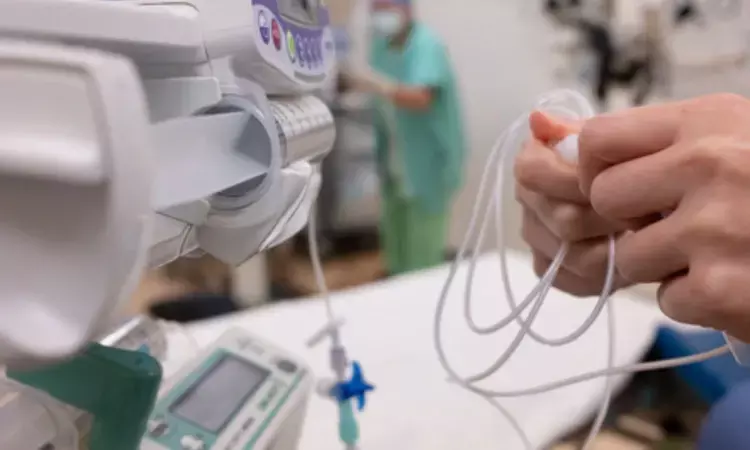- Home
- Medical news & Guidelines
- Anesthesiology
- Cardiology and CTVS
- Critical Care
- Dentistry
- Dermatology
- Diabetes and Endocrinology
- ENT
- Gastroenterology
- Medicine
- Nephrology
- Neurology
- Obstretics-Gynaecology
- Oncology
- Ophthalmology
- Orthopaedics
- Pediatrics-Neonatology
- Psychiatry
- Pulmonology
- Radiology
- Surgery
- Urology
- Laboratory Medicine
- Diet
- Nursing
- Paramedical
- Physiotherapy
- Health news
- Fact Check
- Bone Health Fact Check
- Brain Health Fact Check
- Cancer Related Fact Check
- Child Care Fact Check
- Dental and oral health fact check
- Diabetes and metabolic health fact check
- Diet and Nutrition Fact Check
- Eye and ENT Care Fact Check
- Fitness fact check
- Gut health fact check
- Heart health fact check
- Kidney health fact check
- Medical education fact check
- Men's health fact check
- Respiratory fact check
- Skin and hair care fact check
- Vaccine and Immunization fact check
- Women's health fact check
- AYUSH
- State News
- Andaman and Nicobar Islands
- Andhra Pradesh
- Arunachal Pradesh
- Assam
- Bihar
- Chandigarh
- Chattisgarh
- Dadra and Nagar Haveli
- Daman and Diu
- Delhi
- Goa
- Gujarat
- Haryana
- Himachal Pradesh
- Jammu & Kashmir
- Jharkhand
- Karnataka
- Kerala
- Ladakh
- Lakshadweep
- Madhya Pradesh
- Maharashtra
- Manipur
- Meghalaya
- Mizoram
- Nagaland
- Odisha
- Puducherry
- Punjab
- Rajasthan
- Sikkim
- Tamil Nadu
- Telangana
- Tripura
- Uttar Pradesh
- Uttrakhand
- West Bengal
- Medical Education
- Industry
PRX-115 promising treatment option for patients with gout, finds study

A recent study presented by Orit Cohen Barak in the ACR Convergence 2024 showed that with the extra advantage of a potentially broad dose interval, PRX-115 (Protalix BioTherapeutics) may provide an efficient urate-lowering medication that might improve patient compliance and treatment flexibility of gout cases.
PEGylated uricases have previously shown promise as a therapeutic approach for treating individuals with refractory gout. Utilizing a novel plant cell-based expression technique, the recombinant homotetrameric uricase enzyme PRX-115 is generated from Candida utilis. After purification, the enzyme undergoes a unique modification using unique polyethylene glycol (PEG) molecules. High specific activity, enhanced stability, and decreased immunogenic potential are all features of PRX-115's design.
A single intravenous (IV) infusion of PRX-115 was used to evaluate its safety, tolerability, pharmacokinetics (PK), and pharmacodynamics (PD) in a first-in-human single ascending dosage, double-blinded research (FIH-SAD, NCT05745727). A total of 64 participants, the majority of whom had high urate levels (>6.0 mg/dL), were recruited for the trial and randomly assigned to either PRX-115 or a placebo in a 3:1 ratio (8 cohorts; 6 participants on active and 2 on placebo each cohort). The participants were monitored for 12 weeks, or 85 days.
The findings suggest that PRX-115 single ascending dosages were usually well tolerated, according to key findings from the first 7 cohorts. A total of 18 associated Treatment Emergent Adverse Events (TEAEs) were reported by 11 (26%) subjects who received PRX-115; most of them were mild to moderate and temporary in character. At a modest dosage, one significant adverse event (SAE, anaphylactic response) happened right after the infusion started. The person persisted in the trial when the SAE had completely resolved.
Exposure to PRX-115 grew in a dose-dependent manner, with detectable amounts up to 85 days (12 weeks) after treatment at the high dosages and peak concentrations being recorded right after infusion. A single dosage of PRX-115 quickly lowered plasma urate below 6.0 mg/dL in all tested doses. With urate levels below 6.0 mg/dL that persisted for 12 weeks, the urate-lowering efficacy and response duration were dose-dependent.
Overall, the findings of this FIH-SAD study's first seven cohorts show that PRX-115 may be able to provide a broad dose interval and is a potentially effective therapy choice for gout patients. To validate these results and determine PRX-115's long-term safety and effectiveness in gout patients, more research is necessary.
Source:
Prolonged plasma urate-lowering after a single intravenous administration of PRX-115, a novel PEGylated uricase, in participants with elevated urate levels. (2024, October 15). ACR Meeting Abstracts. https://acrabstracts.org/abstract/prolonged-plasma-urate-lowering-after-a-single-intravenous-administration-of-prx-115-a-novel-pegylated-uricase-in-participants-with-elevated-urate-levels/
Neuroscience Masters graduate
Jacinthlyn Sylvia, a Neuroscience Master's graduate from Chennai has worked extensively in deciphering the neurobiology of cognition and motor control in aging. She also has spread-out exposure to Neurosurgery from her Bachelor’s. She is currently involved in active Neuro-Oncology research. She is an upcoming neuroscientist with a fiery passion for writing. Her news cover at Medical Dialogues feature recent discoveries and updates from the healthcare and biomedical research fields. She can be reached at editorial@medicaldialogues.in
Dr Kamal Kant Kohli-MBBS, DTCD- a chest specialist with more than 30 years of practice and a flair for writing clinical articles, Dr Kamal Kant Kohli joined Medical Dialogues as a Chief Editor of Medical News. Besides writing articles, as an editor, he proofreads and verifies all the medical content published on Medical Dialogues including those coming from journals, studies,medical conferences,guidelines etc. Email: drkohli@medicaldialogues.in. Contact no. 011-43720751


